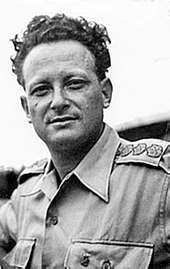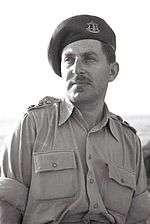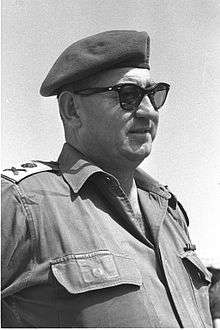Southern Command (Israel)
The Israeli Southern Command (Hebrew: פיקוד דרום, transliterated: Pikud Darom), often abbreviated to Padam (פד"מ), is a regional command of the Israel Defense Forces (IDF). It is responsible for the Negev, the Arava, and Eilat. It is currently headed by Aluf Herzl HaLevi.
History
For many years the Southern Command was tasked with defending the Negev and securing the border on the Sinai Peninsula from Egypt. The Southern Command led IDF troops in five wars against Egypt: the 1948 Arab–Israeli War, the Suez War, the Six-Day War, the War of Attrition, and the Yom Kippur War. This high operational activity and its demanding toll resulted in the Southern Command's Alufs (SCA) being replaced fairly rapidly. The most famous replacements took place in 1973, during the Yom Kippur War, when Shmuel Gonen was suspended as the SCA due to repeated disputes with Ariel Sharon, who was the previous SCA. The government appointed Chaim Bar-Lev, who was the former Chief of Staff, as the new SCA in an emergency directive. After the Egypt–Israel Peace Treaty, the southern front remained quiet and most of the activity centred on guarding the borders from smugglers and fluid security over the Gaza Strip.
During the Al-Aqsa Intifada, the Command was placed in charge-of counter-terrorist efforts. The Gaza Strip, one of the most densely populated places in the world, was known as a stronghold for extremist groups such as Hamas and Islamic Jihad, who engaged in Palestinian political violence. The local production and proliferation of light anti-tank weapons by these groups, made travel by lightly armored vehicles dangerous. From 2004, the fighting in Gaza became especially intensive, and on the IDF's part, included targeted killings, short armored expeditions, and efforts to locate and destroy the smuggling tunnels used by Palestinian militant groups to obtain weapons.
During 2005, the Southern Command was involved in the unilateral Gaza disengagement plan, initiated by Ariel Sharon (Prime Minister of Israel, 2001–2006), which mainly entailed the removals of all Israeli settlements from the Gaza Strip and back to the Israeli side of the Green Line. The Command re-situated itself north of the Gaza fence, while the Philadelphi Route was given to Egypt, who did not however prevent the movement of thousands of Palestinians between the Gaza Strip and the Sinai through the city of Rafah. As of 2006, the attempt to infiltrate Israel to perform suicide bombings and the launch of Qassam rockets, especially by Islamic Jihad and the Popular Resistance Committees, remains ongoing and is the central focus of the Southern Command.
Units

- Southern Command in Beersheba
- 80th "Edom" (Territorial) Division
- 143rd "Fire Fox" (Territorial) Division (former Gaza Division)
- 162nd "Ha-Plada"/"Steel" Armor Division
- 252nd "Sinai" (Reserve) Armor Division
- 5005th "Southern Command" Logistic Support Unit (South West)
- 5006th "Southern Command" Logistic Support Unit (South East)
- Southern Command Signal Battalion
- Southern Command Engineering Unit
- Southern Command Intelligence Unit
- Southern Command Military Police Unit
- Southern Command Medical Unit
- 653rd Maintenance Center
Commanders
| Name | Dates | Image | Notes |
|---|---|---|---|
| Yigal Allon | 1948–1949 |  |
|
| Yitzhak Rabin | 1949 |  |
Acting commander |
| Moshe Dayan | October 1949 – October 1951 | ||
| Moshe Tzadok | October 1951 – January 1954 | ||
| Ya'akov Peri | 1954 | Acting commander | |
| Zvi Gilat | 1955 | ||
| Meir Amit | November 1955 – August 1956 |  |
|
| Asaf Simhoni | August–November 1956 | Acting commander in Operation Kadesh | |
| Haim Laskov | November 1956 – January 1958 |  |
|
| Chaim Herzog | January–July 1958 |  |
|
| Avraham Yoffe | July 1958 – May 1962 |  |
|
| Zvi Zamir | May 1962 – December 1965 | ||
| Yeshayahu Gavish | December 1965 – December 1969 |  |
|
| Ariel Sharon | December 1969 – July 1973 |  |
|
| Shmuel Gonen | July–November 1973 | ||
| Haim Bar-Lev | October 1973 |  |
As former Chief of Staff, assumed command during the Yom Kippur War |
| Israel Tal | November 1973 – January 1973 |  |
|
| Avraham Adan | January–July 1974 | _-_ALUF_AVRAHAM_ADAN.jpg) |
|
| Yekutiel Adam | July 1974 – March 1976 | ||
| Herzl Shafir | March 1976 – February 1978 | ||
| Dan Shomron | February 1978 – January 1982 | ||
| Haim Erez | January 1982 – October 1983 | ||
| Moshe Bar-Kokhva | October 1983 – February 1986 | ||
| Uri Sagi | February–August 1986 | ||
| Yitzhak Mordechai | August 1986 – 1989 | ||
| Matan Vilna'i | 1989 – November 1994 | ||
| Shaul Mofaz | November 1994 – 1996 | ||
| Shlomo Yanai | 1996 – September 1997 | ||
| Yom-Tov Samia | September 1997 – 2000 | ||
| Doron Almog | 2000 – July 2003 | ||
| Dan Harel | July 2003 – October 2005 |  |
|
| Yoav Galant | October 2005 – October 2010 | .jpg) |
|
| Tal Russo | October 2010 – April 2013 | ||
| Sami Turgeman | April 2013 – October 2015 | _(Turgeman_cropped).jpg) |
|
| Eyal Zamir | October 14, 2015 – June 6, 2018 | ||
| Herzl HaLevi | June 6, 2018 – | .jpg) |